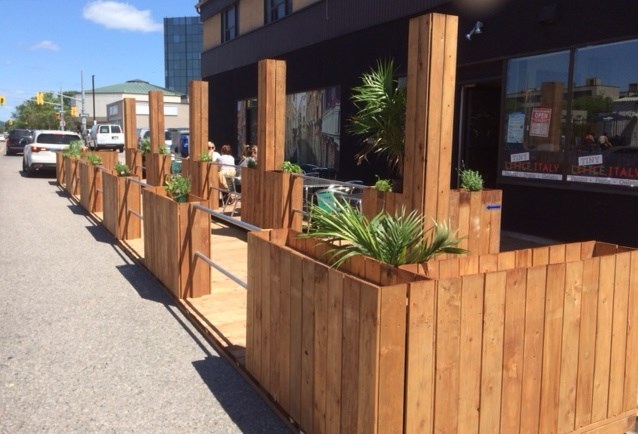The city is considering a sidewalk patio policy that could change the face of downtown in the summer months.
How people interact with a place makes a world of difference and after almost a year of scrutinizing a downtown patio pilot project, city staff are recommending that the rest of the downtown core be able to follow suit.
Last May, local restauranteur Filippo Suriano convinced City Council to allow him to construct a sidewalk patio for his Tiny Italy restaurant as an experiment for the downtown core.
See original story here: New patio with great food equals hotspot for eating
Upon review, city staff deemed the project a success in creating an attractive and vibrant space and, on Monday, City Council directed the new Sidewalk Patio Policy bylaw to the committee level, where it's expected to move forward.
Council approved that pilot project exclusively for Tiny Italy on Wyld Street and, after four months of measuring the results, the success of the project, they say, was palpable.
“Staff are of the opinion that the continued establishment of sidewalk patios in the downtown would be desirable to enhance the ambiance of the area and support the attraction of visitors and increased spending,” reads the report.
The bylaw will allow DIA businesses to set up their sidewalk patio from Victoria Day long weekend in May until the Thanksgiving long weekend in October, which they hope will enhance the ambiance of the downtown core and attract visitors and increased spending.
The bylaw outlines two options: a pop-out sidewalk, which utilizes street parking spots to accommodate temporary pedestrian movement around the sidewalk patio, and a sidewalk patio, which allows a restaurant to set up seating for food and beverage service.
The pilot, after all, seemed to validate what the city is seeking to accomplish: create a thriving urban atmosphere that encourages social gathering and activity with thoughtful seating, landscape and a connection to its surroundings, all while enjoying the favourable climate in the short summer window.
All designs will have to be temporary in nature and must feature fencing and be designed so that there is no change in grade between the sidewalk and pop-out.
The standard application for DIA businesses will cost $400 plus an additional $100 rental fee for each on-street parking spot being taken up by a pop-out sidewalk, if they choose that option.
But the city is recommending that the application fee be waived for all applicants in the first year as an added incentive to get involved.
If approved, the applicants will enter into an annual sidewalk patio agreement with the city and will require the business to maintain public liability insurance of $5 million.
In the pilot project, Suriano built a platform that allowed for pedestrian traffic around the sidewalk patio, utilizing the parking spots in front of the restaurant.
Suriano, who naturally adopted the idea from his old home of Montreal, was responsible for the entire cost of the project and for all liability insurance and any other associated costs, which will be the same for anyone participating under the permanent policy.
The DIA unanimously supported Suriano’s pilot, while almost all of council backed the original pilot pitch last Spring. Coun. Tanya Vrebosch was the only councillor who voted against the pilot project, citing a lack of due process for her apprehension at the time.



